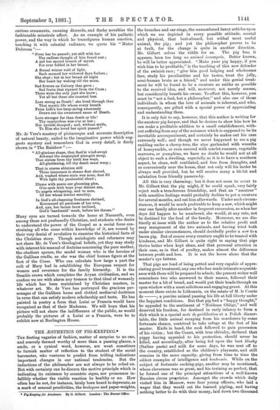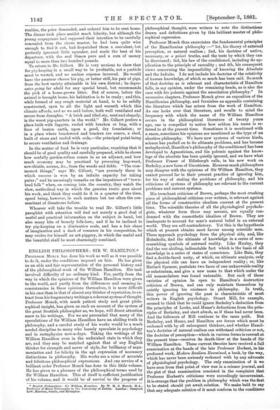THE ESTHETICS OF PIG-K.EEPING.*
Tns fleeting vagaries of fashion, matter of surprise to no one, and scarcely deemed worthy of more than a passing glance, a smile, or a cynical word, however, are wont sometimes -to furnish matter of reflection to the student of the social barometer, who ventures to predict from trifling indications important changes in our national tendencies. But the inductions of the philosopher are not always to be relied on. Not with certainty can he discern the motive principle which is indicating its existence by eccentric signs, nor pronounce in- fallibly whether the visible reaction be healthy or no. How -often has he not, for instance, lately been heard to deprecate, as a mark of sensual proclivities, the brelogues and paper-weights, • Pig-Beeping for Amateurs. By G. Gilbert. London: The Bazar Mee.
the brooches and ear-rings, the unnumbered fancy articles upon which we see depicted in every possible attitude, mental and physical, that best-abused, but withal most useful animal, the pig ; and yet the philosopher proves to be at fault, for the change is quite in another direction.
Mr. Gilbert solves the riddle for us. The pig has, it appears, been too long un animal incompris. Better known, be will be better appreciated. "Make your pig happy, if you wish him to be profitable," is the teaching of this new defender of the swinish race ; "give him good lodging and wholesome fare, study his peculiarities and his tastes, treat the jolly, semi-human brute as a friend," and under this genial treat- ment be will be found to be a creature as unlike as possible to the received idea, and will, moreover, not merely amuse, but considerably benefit his owner. To effect this, however, you must be "not a fool, but a philosopher," and also one of those individuals in whom the love of animals is inherent, and who, consequently, are gifted with a special power of appreciating and understanding them.
It is only fair to say, however, that this author is writing for the amateur pig-keeper, and that he desires to show him how he can make a profitable addition to a small establishment, with- out suffering from any of the nuisance which is supposed to be its inevitable accompaniment, and certainly be makes out his case extremely well ; and though we never happened to see a pig residing under a cherry-tree, the stye garlanded with wreaths of honeysuckle, or even covered with scarlet-runners, vegetable marrows, or pumpkins, we have no doubt he would not at all object to such a dwelling, especially, as it is to have a southern aspect, be clean, well ventilated, and free from draughts, and so conveniently near the house, that not only will his larder be always well provided, but he will receive many a tit-bit and salutation from friendly passers-by.
All this is very charming ; but it does not seem to occur to Mr. Gilbert that the pig might, if he could speak, very fairly reject such a treacherous friendship, and that an " amateur " with sensitive feelings would probably decline to pet a. creature for several months, and eat him afterwards. Under such circum- stances, it would be much preferable to keep a sow, which might rear one family after another in frequent succession, as when her days did happen to be numbered, she would, at any rate, not be destined for the food of the family. Moreover, we are dis- tinctly at issue with the author as to the relative profit and easy mangement of the two animals, and having tried both under similar circumstances, should decidedly prefer a sow to a bacon pig. But of course every creature ought to be treated with kindness, and Mr. Gilbert is quite right in saying that pigs thrive better when kept clean, and that personal attention in their case, as in that of poultry, makes almost the difference between profit and loss. It is not the horse alone that the master's eye fattens.
That pigs are fond of being petted and very capable of appre- ciating good treatment, any one who has made intimate acquaint- ance with them will be prepared to admit; the present writer well remembers two who answered to their names, followed their master for a bit of bread, and would put their heads through an open window with a most solicitous and engaging grunt. At this moment there exists in Lithuania, on the estate of M. le Comte de , a porcine animal passing his life at full liberty under the happiest conditions. But that pig had a "happy thought," he appealed to the sentiment of "Noblesse Oblige," and well deserved his freedom, for destined in early infancy to form a dish which is a special meta de prgdilection at a Polish dinner. table, the little animal escaping from his murderers by some fortunate chance, contrived to take refuge at the feet of his master. Knife in hand, the cook followed to gain possession of his victim ; but the Count, with true chivalry, declared that piggy having appealed to his protection, should never be killed, and accordingly, after being fed upon the best klueky (Italian paste) and milk for some days, he was sent off to the country, established as the children's playmate, and still remains in the same capacity, giving from time to time the oddest examples of intelligence and bonhomie. While on the subject of fortunate sucking-pigs, another may be mentioned, whose cleverness was so great, and his training so perfect, that he formed one of the principal attractions of a well-known Russian circus proprietor. Amongst the crowds which daily visited him in Moscow, were four young officers, who laid a wager that they would eat the learned pigling, and having nothing better to do with their money, laid down two thousand
roubles, the price demanded, and ordered him to be sent home. The dinner took place amidst much hilarity, but although the young scapegraces had supposed their intention to be carefully concealed from the circus master, he had been quite wise enough to find it out, had despatched them a succulent, but perfectly ignorant little squeaker, and made the best of his departure, with the real Simon pure and a sum of money equal to more than two hundred pounds.
To return to Mr. Gilbert. He is very anxious to show that for pig-keeping in a small way to be profitable, not a particle mast be wasted, and no useless expense incurred. He would have the amateur choose his pig, or better still, his pair of pigs, from the best variety attainable in his own district ; he depre- cates going far afield for any special breed, but recommends the pick of a home-grown litter. But of course, before the animal is brought home, his habitation is to be ready ; and this, while formed of any rough material at hand, is to be solidly constructed, open to all the light and warmth which this climate affords, and as we said before, both well ventilated and secure from draughts. "A brick and tiled sty, neat and shapely, is the worst pig-quarters in the world." Mr. Gilbert prefers a place built with faggots, roofed with bracken or ling, with a floor of beaten earth, upon a good, dry foundation ; or in a place where brushwood and bracken are scarce, a shed, built of stone and roofed with sods,—the principal point being to secure ventilation and drainage.
In the matter of food he is very particular, requiring that it should be of good quality and carefully prepared, while he shows how usefully, garden-refuse comes in as an adjunct, and how much economy may be practised by procuring hog-weed, sow-thistle, acorns, Sm., from the woods and fields. "The com- monest things," says Mr. Gilbert, "are precisely those in which success is won by an infinite capacity for taking pains ;" and he amusingly remarks on the impatience of "town- bred folk" when, on coming into the country, they watch the slow, methodical way in which the genuine rustic goes about his work, and think they could do it in a quarter of the time, speed being, however, in such matters but too often the con- comitant of disastrous failure.
Whoever will take the trouble to read Mr. Gilbert's little pamphlet with attention will find not merely a good deal of useful and practical information on the subject in hand, but also many bits of homely folk-lore; and if he be inclined to try pig-keeping on a diminutive scale, and has a fair share of imagination and a dash of romance in his composition, he may evolve for himself an art-piggery, in which the useful and the beautiful shall be most charmingly combined.



































 Previous page
Previous page